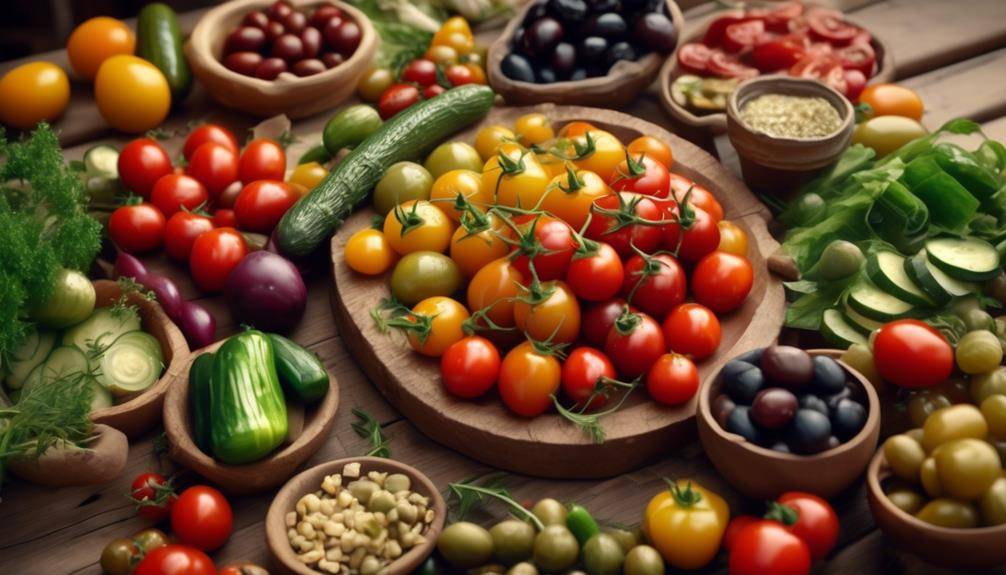The Best Greek Vegetable Dishes And Seasonal Produce

Greek Vegetable Dishes And Seasonal Produce; Are you tired of the same old vegetable dishes? Look no further! Greek cuisine offers a delightful array of vegetable dishes that will make your taste buds dance with joy. From juicy tomatoes bursting with flavor to crisp cucumbers that leave a refreshing sensation, Greek seasonal produce is truly a treasure trove of culinary delights. But that’s not all – we have some must-try Greek vegetable recipes and expert tips on how to make the most of the seasonal produce. So, why settle for ordinary when you can indulge in the extraordinary flavors of Greek vegetable dishes?
Traditional Greek Vegetable Dishes
If you’re looking to experience the vibrant and delicious flavors of Greek cuisine, then exploring traditional Greek vegetable dishes is a must. Greek vegetable dishes are not only bursting with flavor but also perfect for health-conscious eaters. These dishes are packed with nutrient-rich ingredients and are often prepared using fresh, seasonal produce.
To understand the history of traditional Greek vegetable dishes, we must dive into the rich culinary heritage of Greece. The ancient Greeks believed in the importance of a balanced diet, which included a variety of vegetables. They recognized the health benefits of incorporating vegetables into their meals and developed unique recipes that showcased the natural flavors and textures of these ingredients.
One famous traditional Greek vegetable dish is ‘Briam’, a Mediterranean-style roasted vegetable medley. It consists of a combination of zucchini, eggplant, bell peppers, onions, and tomatoes, all roasted to perfection with olive oil and Greek herbs. The result is a dish that is not only visually appealing but also bursting with flavors and aromas.
Another popular dish is ‘Spanakorizo’, a simple yet hearty spinach and rice dish. This dish combines fresh spinach with aromatic herbs, onions, and garlic, cooked with rice to create a comforting and nutritious meal. It is often served as a main course or as a side dish alongside grilled meats or fish.
These traditional Greek vegetable dishes are not only a celebration of the country’s culinary heritage but also a testament to the health-conscious Mediterranean diet. By exploring these dishes, you can savor the vibrant flavors and reap the numerous health benefits that come with incorporating vegetables into your meals. So, why not embark on a culinary adventure and indulge in the world of traditional Greek vegetable dishes?
Seasonal Produce in Greek Cuisine
When exploring the vibrant flavors of Greek cuisine, it is essential to understand the significance of seasonal produce in creating authentic and delicious dishes. Greek vegetable markets are a treasure trove of fresh, locally sourced ingredients that form the foundation of traditional Greek recipes. Here are three reasons why incorporating seasonal produce into your Greek dishes is not only beneficial but also adds a burst of flavor to your meals:
- Superior Taste and Quality: Seasonal produce is picked at the peak of ripeness, ensuring that it is bursting with flavor. Vegetables like tomatoes, cucumbers, and peppers, which are essential in Greek cuisine, taste sweeter and juicier when they are in season. By using these fresh ingredients, you can elevate the taste of your dishes to new heights.
- Nutritional Benefits: Eating seasonal produce means consuming fruits and vegetables when they are at their most nutritious. These ingredients are packed with vitamins, minerals, and antioxidants that are essential for maintaining a healthy diet. From crisp lettuce to vibrant eggplants, seasonal vegetables offer a wide range of health benefits that contribute to your overall well-being.
- Environmental Sustainability: By choosing seasonal produce, you are supporting local farmers and reducing your carbon footprint. Seasonal vegetables are often grown locally, which means they don’t require long-distance transportation. This not only reduces greenhouse gas emissions but also helps promote sustainable farming practices.
Incorporating seasonal produce into your Greek dishes not only enhances the flavors but also offers numerous health benefits and supports sustainable farming practices. So, the next time you visit a Greek vegetable market, embrace the seasonal offerings and let the natural flavors of the produce shine in your culinary creations.
Must-Try Greek Vegetable Recipes
Get ready to tantalize your taste buds with these irresistible Greek vegetable recipes. Greek cuisine is known for its vibrant flavors and fresh ingredients, and these vegetable dishes are no exception. Whether you’re a vegetarian or simply looking to incorporate more vegetables into your diet, these recipes will surely satisfy your cravings.
One popular Greek vegetable cooking technique is roasting. Roasting vegetables brings out their natural sweetness and adds a delicious caramelized flavor. Try making Greek-style roasted vegetables by tossing a mix of bell peppers, eggplant, zucchini, and cherry tomatoes with olive oil, garlic, oregano, and a squeeze of lemon juice. Roast them in the oven until they are tender and slightly charred. This dish is perfect as a side dish or even as a main course.
Another must-try Greek vegetable recipe is Spanakopita, a traditional Greek spinach pie. Made with layers of buttery phyllo pastry and a filling of sautéed spinach, feta cheese, and herbs, Spanakopita is a flavorful and satisfying appetizer. The combination of the flaky pastry and the creamy, savory filling is simply irresistible.
If you’re in the mood for something light and refreshing, try the classic Greek salad. This salad is made with fresh tomatoes, cucumbers, red onions, Kalamata olives, and feta cheese, all tossed together with olive oil, lemon juice, and oregano. The flavors are bright and tangy, and the salad is the perfect accompaniment to any meal.
Tips for Cooking With Greek Seasonal Produce
To make the most of Greek seasonal produce, follow these tips for cooking with fresh and flavorful ingredients.
- Embrace the simplicity of Greek cooking techniques: Greek cuisine is known for its simplicity and emphasis on fresh ingredients. When cooking with Greek seasonal produce, it’s best to let the flavors shine through by using simple cooking techniques. Whether it’s grilling a juicy eggplant, roasting a medley of vegetables with olive oil and herbs, or lightly sautéing zucchini with garlic and lemon, these techniques allow the natural flavors to take center stage.
- Opt for healthy cooking methods: Greek cuisine is not only delicious but also known for its health benefits. To maximize the nutritional value of Greek seasonal produce, opt for healthy cooking methods such as steaming, baking, or poaching. These methods help retain the vitamins, minerals, and antioxidants present in the fresh produce, ensuring that you get the most out of your meals.
- Experiment with traditional Greek flavor combinations: Greek cuisine is renowned for its unique flavor combinations. When cooking with Greek seasonal produce, don’t be afraid to experiment with traditional Greek herbs and spices such as oregano, dill, mint, and lemon. These flavors complement the fresh produce beautifully and add a distinct Greek touch to your dishes.
Greek Vegetable Dishes for Every Season
Looking to explore the diverse flavors of Greek cuisine throughout the year? Discover a variety of delicious Greek vegetable dishes that are perfect for every season. Greek cuisine is known for its emphasis on fresh and seasonal ingredients, and vegetables play a central role in many traditional Greek dishes. From hearty winter stews to light summer salads, there is a Greek vegetable dish to satisfy your cravings all year round.
In the colder months, Greek cuisine offers a range of comforting vegetable dishes that will warm your soul. One popular dish is briam, a roasted vegetable medley that combines potatoes, eggplant, zucchini, and tomatoes. The vegetables are seasoned with olive oil, garlic, and fragrant herbs like oregano and thyme, then baked until tender and caramelized. Another winter favorite is spanakorizo, a simple yet satisfying spinach and rice dish. The spinach is sautéed with onions and garlic, then cooked with rice and vegetable stock until soft and fluffy.
As the weather gets warmer, Greek vegetable dishes become lighter and more refreshing. One classic summer dish is horiatiki, a traditional Greek salad bursting with flavors. It combines ripe tomatoes, cucumbers, onions, bell peppers, olives, and feta cheese, all dressed with olive oil, lemon juice, and oregano. Another popular summer dish is gigantes plaki, which features large butter beans cooked in a rich tomato sauce with onions, garlic, and herbs. The beans become tender and creamy, making it a perfect dish to enjoy with crusty bread on a hot summer day.
Greek vegetable cooking techniques often involve simple preparations that allow the natural flavors of the vegetables to shine. Whether it’s roasting, sautéing, or simply serving them fresh in a salad, Greek cuisine celebrates the beauty of seasonal produce. So, no matter the time of year, there is always a delicious Greek vegetable dish waiting to be enjoyed.
Frequently Asked Questions: Greek Vegetable Dishes And Seasonal Produce
What Are Some Popular Greek Vegetable Dishes That Are Not Mentioned in the Section on Traditional Greek Vegetable Dishes?
If you’re looking for unique Greek vegetable dishes not mentioned in the section on traditional Greek vegetable dishes, you might want to explore the wide variety of seasonal produce and the traditional preservation methods used in Greek cuisine.
Are There Any Unique or Lesser-Known Vegetables Commonly Used in Greek Cuisine That Are Not Mentioned in the Section on Seasonal Produce in Greek Cuisine?
Are you curious about the unique Greek vegetables and lesser-known seasonal produce used in Greek cuisine? Discover the hidden gems that add flavor and vibrancy to traditional dishes. Explore the richness of Greek cuisine!
Can You Provide a Recipe for a Greek Vegetable Dish That Is Not Included in the Must-Try Greek Vegetable Recipes Section?
Looking for unique Greek vegetable dishes? Get creative with cooking Greek seasonal produce! Try a delicious recipe that’s not included in the must-try section. You’ll discover new flavors and expand your culinary repertoire.
What Are Some Specific Cooking Techniques or Tips for Preparing Greek Seasonal Produce That Are Not Mentioned in the Tips for Cooking With Greek Seasonal Produce Section?
To enhance the flavors of Greek seasonal produce, try alternative cooking methods like grilling or roasting. For longer freshness, remember to store them properly by keeping them in a cool, dry place or using methods like blanching and freezing.
Are There Any Greek Vegetable Dishes That Can Be Enjoyed Year-Round and Are Not Mentioned in the Section on Greek Vegetable Dishes for Every Season?
Year round Greek vegetable dishes, beyond the seasonal options, include spanakopita (spinach pie) and briam (oven-roasted vegetables). These delicious and nutritious dishes can be enjoyed any time of year, adding a taste of Greece to your meals.
Conclusion
In conclusion, Greek vegetable dishes are not only delicious but also showcase the abundance of seasonal produce in Greek cuisine. From traditional recipes to modern twists, there is something for everyone to enjoy. By incorporating Greek seasonal produce into your cooking, you can create flavorful and nutritious meals all year round. So why not explore the world of Greek vegetable dishes and experience the taste of Greece in every bite?








